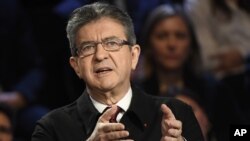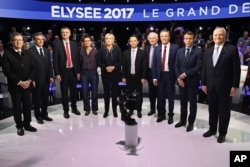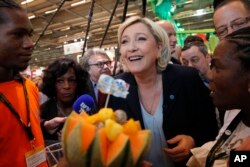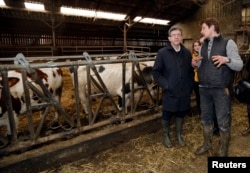The winner of France's presidential election debate this week was a fast-talking, maverick leftist whose policies would prove just as much a shock to financial markets as those of the more prominent leader of the far right.
Jean-Luc Melenchon, a former Trotskyist who would pull France out of NATO and possibly out of the European Union too, is climbing fastest in the polls with just over two weeks to go before the first round of a closely-fought election.
In a snap poll after Tuesday night's four-hour debate, viewers found Melenchon, 65, the most convincing of the 11 candidates, outshining frontrunners Emmanuel Macron, an independent centrist, far-right leader Marine Le Pen, and mainstream conservative Francois Fillon.
Melenchon skirmished with Le Pen over religion and called for the debt of troubled eurozone states to be effectively written off to allow massive new investment to spur growth.
"The debt won't be paid either in France, Spain, Portugal or Greece. The European Central Bank must buy up all the debt ... so that our states can find a way to breathe again," he said.
Melenchon, founder of the "France Unbowed" party, has split the left-wing vote and turned the Socialists into also-rans after five years of unpopular rule by Socialist President Francois Hollande.
A Le Monde/Cevipof poll published on Tuesday put Melenchon's support at 15 percent, up 3.5 points from mid-March.
He is still well behind Le Pen and Macron, who both have about a quarter of the vote, according to the poll, and are favorites to go through to the May 7 run-off.
But he is breathing down the neck of early frontrunner Fillon, on 17.5 percent, and is well ahead of Socialist candidate Benoit Hamon, on 10 percent.
It is Melenchon's second run at the presidency. He finished fourth with 11 percent of the vote in 2012.
Kitted out in a revolutionary-style, high-lapelled Mao jacket and with a rapid-fire delivery sprinkled with quotes from Karl Marx and the 19th French writer Victor Hugo, Melenchon is the scourge of established party chiefs.
At a weekend rally in Chateauroux, he said "a chair, a table, a bench" had more chance of winning than did Le Pen.
His fellow left-winger, Hamon, has fared no better. Spurning Hamon's entreaties to unite behind him, Melenchon said he had no intention of hitching his campaign to a "funeral hearse."
EU Doubts
Melenchon may get another lift if Hamon's support erodes further. Only about half of Hamon's supporters are certain to vote for him - the lowest certainty score of any of the main candidates, according to Cevipof.
"I didn't think there would be such a big turnout," said Philippe Herault, 57, surveying thousands of cheering Melenchon supporters at the rally in Chateauroux in central France. "It is a sign that people want change, want something different."
Retired agricultural inspector Roger Barralis, 72, speaking after another campaign event in Paris, said he admired Melenchon's deep thinking and oratorical powers.
"But mostly, it's his intelligence, his ability to speak to everybody," he said.
Although Melenchon, who is backed by the French Communist Party, is from the other end of the political spectrum to Le Pen, he advocates policies similar to hers in some areas.
On Europe, his "Plan A" is to negotiate an overhaul of the EU along "democratic, social and ecological" lines.
In an echo of the process that led to Britons voting to leave the EU last June, Melenchon would put the results of the negotiation to a referendum on whether to stay or leave the EU.
If the negotiation option fails, he would suspend France's contributions to the EU budget and impose border controls on movement of capital and goods.
He calls the United States the world's "most dangerous" military power and would pull France out of NATO, impose a 90 percent tax on top earners and rewrite France's constitution.
There are major differences too between Melenchon, who quit the Socialist Party in 2008, and Le Pen.
In the debate, Melenchon poked fun at the National Front leader's proposal to reform the constitution to protect Catholic traditions like nativity scenes.
"Sixty percent of the French have no religion, so give us a break with religion," he said.








